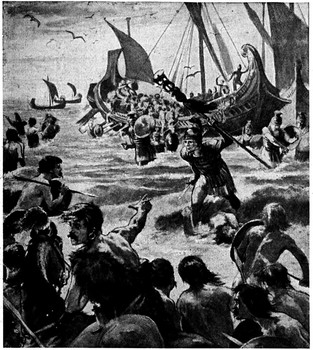The Life of Julius Caesar
|
Share This Page
|
|
|
|
|
|
|
Follow This Site

|
 |
|
|
Part 2: Government and Gaul
 Pompey was a great general who had great successes in the field. He won a series of great victories in Asia and returned to Rome in 62 to ask the Senate to approve of the territory arrangements that he had made as a result of his victories on the battlefields. Crassus, who was quite jealous of Pompey's war successes, persuaded the Senate not to approve of Pompey's plans.
Pompey was a great general who had great successes in the field. He won a series of great victories in Asia and returned to Rome in 62 to ask the Senate to approve of the territory arrangements that he had made as a result of his victories on the battlefields. Crassus, who was quite jealous of Pompey's war successes, persuaded the Senate not to approve of Pompey's plans.
Caesar, sensing an opportunity, persuaded the two consuls to work together and promised to support both of them. His price: a consulship of his own. Crassus and Pompey agreed, and 60 B.C. saw the formation of the First Triumvirate. (Pompey, who might have been suspicious of Caesar's motives at this time, was probably pacified by his new wife, who happened to be Caesar's daughter, Julia.) Caesar had also taken a new wife himself, by the name of Calpurnia.
Within a year, Caesar was true to his word: Pompey's proposals were approved, so were Crassus's and Caesar himself was granted a five-year term as proconsul of Gaul after his tour of duty as a consul had finished.
He left for Gaul in 58 and ended up staying there for nine years. During this time, he directed great military victories but also personally killed or had killed a great many people who stood in his way. The Gaul that he conquered included what is now France, Belgium, southern Holland, Germany west of the Rhine River, and most of Switzerland.
 He led expeditions across the English Channel to Britain in 55 and 54 B.C. Neither expedition succeeded in establishing a permanent base. The Roman "civilization" of Britain would have to wait.
He led expeditions across the English Channel to Britain in 55 and 54 B.C. Neither expedition succeeded in establishing a permanent base. The Roman "civilization" of Britain would have to wait.
With Caesar making a name for himself with his great victories in Gaul and his attempts at subjugating Britain, Crassus and Pompey grew jealous (and, many historians argue, rightfully so). They had been in power and winning wars before Caesar happened on the scene, and they didn't like him getting most of the credit for Rome's recent successes. Itching for victories, Crassus requested and received command of the armies of the East. His reward was a quick death in a battle against the Parthians. Pompey, meanwhile, was increasingly an enemy of Caesar, mainly because nothing kept them together anymore. Julia, Caesar's daughter and Pompey's wife, had died in childbirth in 54. With Crassus gone, the two great generals were suspicious of each other, and each wanted to be sole consul.
Next page > Civil War and Victory > Page 1, 2, 3, 4, 5